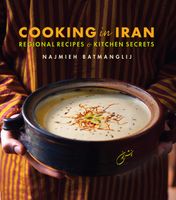A Caspian Story
Published 2020
On our way to Rasht, the capital of Gilan province and the main city of the Caspian region, we stopped at an olive shop in Rudbar. I bought some olive oil, pickled olives, and garlic to take back to my family in Tehran. When I asked the owner what he considered the tastiest local dish, he answered, “My mother’s sweet and sour patties/shami-e torsh.” I asked him where his mother lived, and he pointed upstairs. We climbed the stairs, and found a beautiful family: mother, daughter-in-law, and her two children. The mother, Om al-Kolsum Asadi Golshotori, served us tea and just-picked apricots from the one tree in their backyard. Then she explained how the patties/shami were an easy dish to make. The way she cooked and served us this simple lunch with some fresh local bread touched all of us. She made us feel part of her family. After lunch, she told me about the pain of losing one of her sons in the war with Iraq. I said it might be better to count her blessings instead of dwelling on her loss. All of a sudden she looked into my eyes and nodded her appreciation. We took photos and bought more olive oil. When we said goodbye, I could see in her face that we had truly communicated with one another—she by her hospitality and generosity and me by my encouragement. I found this to be a recurring theme throughout my trip: Iranians, and especially women, touched my heart again and again with their kindness and generosity of spirit toward total strangers. As the poet
Become a Premium Member to access this page
Unlimited, ad-free access to hundreds of the world’s best cookbooks
Over 160,000 recipes with thousands more added every month
Recommended by leading chefs and food writers
Powerful search filters to match your tastes
Create collections and add reviews or private notes to any recipe
Swipe to browse each cookbook from cover-to-cover
Manage your subscription via the My Membership page
In this section
Part of
Advertisement
Advertisement


